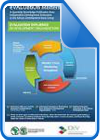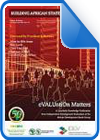

The impact of evaluations on development work is rarely overtly acknowledged. This sometimes leads to a questioning of the cost and usefulness of evaluations. Yet, there is ample evidence that evaluations contribute to the effectiveness of development work and often change the trajectory of development efforts. This issue of eVALUation Matters showcases evaluations that made a difference or had a lasting impact on development work.

"A flag and an anthem surely mean a great deal; and so too do more prosaic and substantial things – a functioning society, a strong economy, and strong institutions". Donald Kaberuka, former AfDB President.
What does Africa Need? Peacebuilding, Statebuilding, or Nation Building? ' The three concepts are central to the Bank’s work in building African nations. This edition of Evaluation Matters looks closely at what it takes to build a nation.
The transport sector is a core priority for the African Development Bank (AfDB). Deficiencies in transport infrastructure and high transport costs have a substantial impact on development, posing challenges for economic competitiveness of business, provision of social and economic services and intraregional trade. Also, While the African region possesses only 2% of the world’s vehicles it contributes 16% to the global deaths. In informing the renewal of the Bank's Transport Sector Policy, an IDEV evaluation sought to answer four main evaluative questions:
“Today there is growing recognition that gender equality is not only a critical human rights issue for women and girls, it is a prerequisite for the achievement of broader development goals, effective humanitarian response and sustainable peace and security.” Phumzile Mlambo-Ngcuka, United Nations Under-Secretary-General and Executive Director of UN Women.
This edition of Evaluation Matters focuses on the importance of gender equality in development of the continent.
The traditional role for the independent evaluation function housed in various multilateral development banks is to focus on the performance of programs financed by the respective institutions. Most of the evaluations conducted are ex-post. However, regardless of how well they are conducted and how influential they are with respect to reforms, they are a small part of the national public investment program.
A learning event "On the Road to Transformation: Learning from Experience" was held in Pretoria, South Africa on August 28-29, 2013. The objective was to allow the Bank and its key partners to discuss lessons learned from recent evaluations and envisage the way forward as the Bank embarks on the implementation of its Ten-Year Strategy, which was approved in 2013. The event focused on such strategic areas as regional integration, working with the private sector, cross-border transport, and economic and sector work.